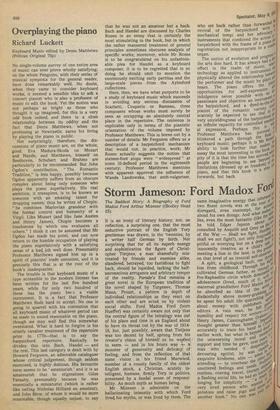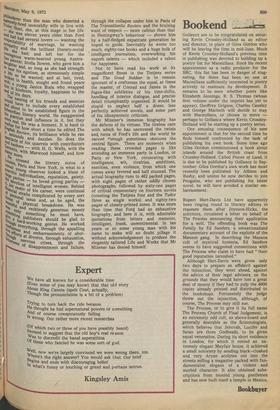Storm Jameson: Ford Madox Ford
The Saddest Story: A Biography of Ford Madox Ford Arthur Mizener ((Bodley Head E5).
It is an irony of literary history, not, on reflection, a surprising one, that the most seductive portrait of the English Tory gentleman was drawn, in the 'twenties, by a writer half German by birth. Nor surprising that for all its superb energy and sophistication the figure of Christopher Tietjens, a man shamefully mistreated by friends and enemies alike, slandered, betrayed, too fastidious to fight back, should be lopsided, lacking the halfunconscious arrogance and arbitrary temper of the reality. Parade's End remains a great novel in the European tradition of the novel shaped by Turgenev, Thomas Mann, Proust, a pattern in depth of individual relationships as they react on each other and are acted on by violent social shifts. Ford Madox Ford (born Hueffer) was certainly aware not only that the central figure of the tetralogy was out of his place and time in an England about to have its throat cut by the war of 191418, but, just possibly, aware that Tietjens was too decent by half, sprung from his creator's vision qf himself as he wa ted, to seem and in his hours was a' monster of generosity and deIicây of feeling, and from the reflection of that same vision in his friend MarwOod, member of a county family of the oldest English stock, a Christian, acutely intelligent, humane, firmly Tory in politics, possessed by a feudal sense of responsibility. As much myth as human being.
Mr Mizener is admirable on the hallucinating intensity with which Ford lived his myths, or was lived by them. The same imaginative energy that iroh—of two finest novels was at the root urfid disregard, even contempt, for ac,cesiii about his own doings. And what Ma'ste lies, even the most fantastic (like the beiO he told Edgar Jepson about Ile eve consulted by Asquith and Grey 011 tffer, of the War — Shall we fight, shall we not fight?), not only forgtie-vel!j pitiful or worrying but on a deep tale innocently creative as a child's reser meeting a lion in the lane, is the Peer' h him from sfrpolimt, achgiledohl000dgic on that level of an ironical self-ohsit Or° jr adolescence (lived, much of it, 13rovifii"; alThfarouultg,hrahillr.,.sughbigihhili; cultivated German father, as tbr.-ated „"i5 Pre-Raphaelite circle which doroitl maternal grandfather Ford Marl°Nre5i,nr he absorbed an idea of the 7 r disdainfully above moneY-grub.bi ffre,4 he spent his adult life quarrelling sgolL'e' about money with publishers, geow editors. A vain man, he felt co pe humility and respect for WIt,e,rs:liaill",,,ple Henry James, Cunninghame thought greater than himself', colirs,i5 accurately to trace his hand irlA doub:101 earlier work, but what is beyou."tefiecIo$ the unwearying moral and Inears, A support and time he gave, over Yrata of man who needed it desPre'apobleo5 devouring egotist, he was h'eri bed'I exquisite kindness, able — wool)" attending — to overhear the°FroPliice. unuttered feelings and needs', eiti,II,.e01; restless, craving travel, literarY„eratil"fr) a flashing social life, he had l00e1Y longing for simplicity — "8 old : very tired person who wall everfor potatoes and raise pigs and /lever ' another book." No one was Philanderer than the man who deserted a v"ru.,,QW1Y-bred unworldly wife to live with 'et Hunt, she, at this stage in her life was eleven years older than Ford rZ"' oad had several lovers — wanting the s'sPectability of marriage, he wanting ItYfille, Pa% and the brilliant literary-social cNrage she had; and left her for the li s L4„_ ° warm-hearted young Austradan Painter, Stella Bowen, who gave him a toaughter b and, so long as she had strength a lear his egotism, as strenuously simple bmte as he wanted; and at last, tired, w-ith'en in health, sought and found peace hi „,–,a Young Janice Biala who wrapped en– in kindness, loyalty, happiness to the .risd ef his days. W.0-11,1,e naming of his friends and enemies hrict"'"' have to include every established about to be established figure in the his"ardian literary world. He exaggerated Wer ,?°sition and influence in it, but they reai;0 real. He was a ferment. It is hard to tnp',,,_'e for how short a time he edited The it '41 Review, its brilliance while he ran apt astound_ and dazzles. So does the u aridetta,4-'e of his quarrels with contributors qa ackers rnaNtlett — with H. G. Wells, with the s, with Marwood himself, and how More, 1,0ild Crossed the literary scene of tast:ini Paris and New York, in what to a leleir;Y011ng observer looked a blaze of larp:'le individualism, reputation, gaiety, tile', Parties — he loved giving parties — It, /7v°tion of intelligent women. Behind "tnotiv of his career, were continual tta,ial straits complicated by every sort thr‘et"ortal issue and, as he aged, the hste'f„?1 Physical breakdown. He was and recklessly generous: money 3°41etic.1).111Y something he must have, Rive ,ITIg Publishers should be glad to %rola'" , hard-working genius. He worked. %ilk!. everything, through the appalling eiTtcl„rls and embarrassments of abor„Ito _.,.,rtsnearvt divorce, through exhaustion, 11' Ugh itte_ 4nes, crises, through the of disappointment and failure, through the collapse under him in Paris of The Transatlantic Review and the bruising want of respect — more callous than that in Hemingway's behaviour — shown him by a half-fledged expatriate generation he hoped to guide. Inevitably he wrote too much, eighty-one books and a huge bulk of intelligent journalism, overworking his superb talents — which included a talent for happiness.
Not to have read his work at its magnificent finest in the Tietjens series and The Good Soldier is to remain ignorant of a craftsman the equal, at times the master, of Conrad and James in the fugue-like subtleties of his time-shifts, handling of interior dialogue, and precise detail triumphantly organised. It would be stupid to neglect half a dozen less perfectly achieved novels, and some part of his idiosyncratic criticism.
Mr Mizener's immense biography has the defects of its virtues. The tireless care with which he has uncovered the twists and turns of Ford's'life and the world he moved tlitough sometimes obscures the central figure. There are moments when reading these crowded pages is like attending an immense party in London, or Paris or New York, coruscating with intelligence, wit, rivalries, ambitions, enmities, even violence, from which one comes away fevered and half stunned. The actual biography runs to 462 packed pages, with eight pages of rather oddly chosen photographs, followed by sixty-one pages of critical commentary on fourteen novels (counting the Tietjens four and the Tudor three as single works) and eighty-two pages of closely-printed notes. It was more than time that Ford had an exhaustive biography, and here it is, with admirable quotations from letters and memoirs, intelligent, frank, unsentimental. In ten years or so some young man with his name to make will no doubt pillage it without acknowledgement to produce the elegantly tailored Life and Works that Mr Mizener has denied himself.











































 Previous page
Previous page